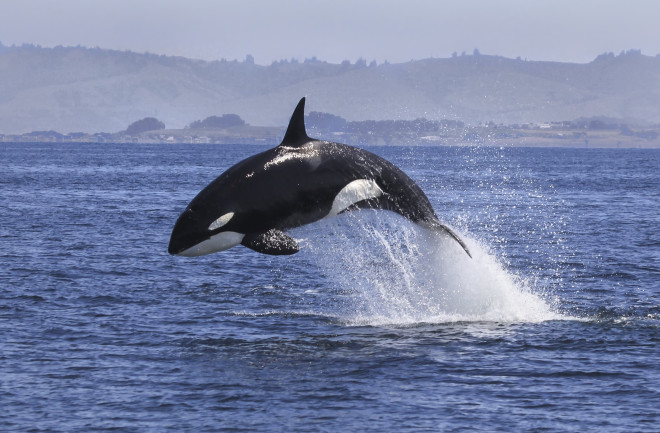Orcas know there is strength in numbers. The whales typically hunt in packs and ambush larger prey like seals, other whales, and sea lions. But, in an odd case, researchers have recently observed orcas hunting alone — and attacking the apex predator, the great white shark.
An orca could attack great white sharks for their liver, which is rich in fats, as explained in a press release by Alison Towner, marine biologist and study author. Researchers have seen killer whales attack sharks before in groups or pairs, but in a new study published in the African Journal of Marine Science, an orca for the first time was seen attacking a great white shark by itself.
Read More: Orcas May Devour Marine Mammals, But They Typically Avoid Harming Humans
The Lone Orca
Researchers observed the behavior in an orca named Starboard. They saw that Starboard attacked a young, great white shark and managed to tear its liver out within two minutes. Citizen scientists, tourists, researchers, and wildlife organizations collected the orca data.
"Witnessing a white shark's fin break the surface initially sparked excitement, but that turned to a somber realization as Starboard swiftly approached," said Esther Jacobs in a press release, a conservation manager with Keep Fin Alive, who witnessed the event.
Scientists confirmed this after they saw Starboard carry his lunch past a boat. They also caught sight of another shark carcass, meaning that Starboard killed two great whites in this event.
"The study raises critical questions about the impact of killer whale predation on shark populations in South Africa," Towner said in a press release. "The displacement of various shark species due to killer whale presence may have implications for mesopredator release and potential trophic changes in the marine ecosystem."
Fascinating Behaviors
Orcas are extremely intelligent and will learn new hunting strategies from watching others or on their own. Recently, orcas have gained attention from scientists when they attacked small vessels in 2022. The orcas smacked into small boats repeatedly. Why they did this may have spanned from learned social behaviors, such as fads, or even self-defense.
Other studies have found that orcas have preyed on other coastal predators like sevengill sharks and have feasted on only their livers in South Africa.
Read More: Orcas Have Social Trends Like Us, And This One Could Get Dangerous For Boats
A Changing Ecosystem
Understanding orca's predatory behaviors will help experts know how to conserve marine ecosystems and adapt to new conservation strategies. Especially since the orca's predatory behaviors are causing sharks to move away from areas they are typically in. One study, on which Towner was the first author, found that they started to move east as the whales continued to attack sharks in Gansbaai, South Africa.
Towner suspects this will have effects on the ecosystem over time. "The presence of these shark-hunting killer whales possibly ties into broader ecosystem dynamics."

